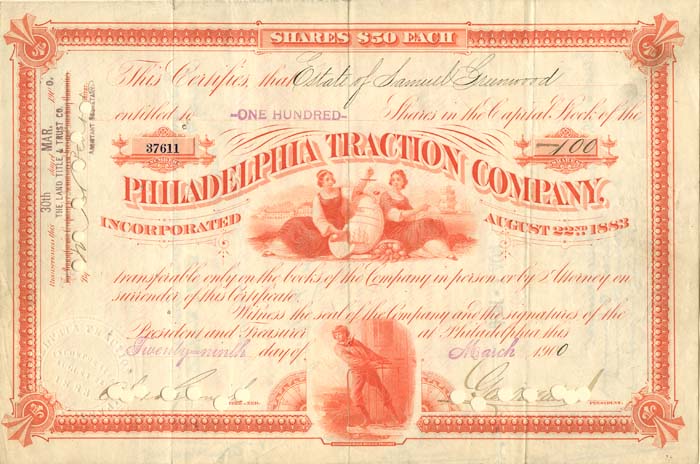Philadelphia Traction Co. signed by George Dunton Widener - Stock Certificate
Inv# AG1622 Stock
Stock printed by American Bank Note Co., Philad. Signed by Geo. D. Widener, who died in the sinking of the Titanic. Portrait and biography included.
George Dunton Widener (June 16, 1861 – April 15, 1912) was an American businessman who died in the sinking of the RMS Titanic.
Widener was born in Philadelphia on June 16, 1861. He was the eldest son of Hannah Josephine Dunton (1836–1896) and Peter Arrell Brown Widener (1834–1915), an extremely wealthy streetcar magnate.
He joined his father's business and eventually took over the running of the Philadelphia Traction Company, overseeing the development of cable and electric streetcar operations. He also served on the board of directors of several important area businesses, including Philadelphia Traction Co., Land Title Bank and Trust Co., Electric Storage Battery Co., and Portland Cement Co. A patron of the arts, Widener was a director of the Pennsylvania Academy of Fine Arts.
In 1912, Widener, his wife, and their son Harry traveled to Paris, France, with original intentions to find a chef for Widener's new Philadelphia hotel, The Ritz Carlton. The Wideners booked their return passage on RMS Titanic. After the ship struck an iceberg, Widener placed his wife and her maid Amalie Gieger in a lifeboat. The women were rescued by the steamship RMS Carpathia, but Widener and his son Harry and their valet Edwin Keeping perished on the Titanic. The bodies of the father and son, if recovered, were not identified.
In 1883, he married Eleanor Elkins, the daughter of his father's business partner, William Lukens Elkins. Together, they had two sons and a daughter:
- Harry Elkins Widener (1885–1912), who died aboard the Titanic.
- George Dunton Widener Jr. (1889–1971), who married Jessie Sloane Dodge (1883–1968) in 1917.
- Eleanor Widener (1891–1966), who married Fitz Eugene Dixon on June 19, 1912. Eleanor sued Dixon for divorce in 1936.
After Widener and his son's death aboard the Titanic, a memorial service was held at St. Paul's Episcopal Church in Elkins Park, Pennsylvania, where stained glass windows were dedicated in their memory.
He was the maternal grandfather of Fitz Eugene Dixon Jr. (1923–2006). Dixon, who lived in Philadelphia, owned the Philadelphia 76ers and was a part owner of the Eagles, the Phillies and the Flyers.
Widener had commissioned Horace Trumbauer to design and oversee construction of Miramar, a 30,000-square-foot (2,800 m2) French neoclassical-style mansion bordering Bellevue Avenue on Aquidneck Island at Newport, Rhode Island. Intended as a summer home, it was still in the design stage at the time of his death.
Widener was played by Guy Standing, Jr. in the film Titanic (1953).
The Philadelphia Transportation Company (PTC) was the main public transit operator in Philadelphia, Pennsylvania, from 1940 to 1968. A private company, PTC was the successor to the Philadelphia Rapid Transit Company (PRT), in operation since 1902, and was the immediate predecessor of the Southeastern Pennsylvania Transportation Authority (SEPTA).
PTC was established on January 1, 1940, by the merger of the PRT and several smaller, then-independent transit companies operating in and near the city. It operated a citywide system of bus, trolley, and trackless trolley routes, the Market–Frankford Line (subway-elevated rail), the Broad Street Line (subway), and the Delaware River Bridge Line (subway-elevated rail to City Hall, Camden, New Jersey, and now part of the PATCO Speedline) which became SEPTA's City Transit Division. PTC operated the rapid transit lines in urban Philadelphia – principally the Market–Frankford Line and Broad Street Line – leasing their fixed infrastructure from the City of Philadelphia. Most suburban transit lines were operated by Suburban Transportation Company known as Red Arrow (Trolley Lines, Southern Penn Bus Company (Bus Lines) and Philadelphia & Western Railway (Norristown and Strafford interurban lines). PTC's network also included the Philadelphia trolleybus system, which was much smaller, along with numerous bus lines.
Among PTC's first actions was to begin replacing its aging fleet of vehicles. In 1940, the company placed orders for 130 PCC streetcars, 50 trackless trolleys, and 53 motor buses.
In 1944, during the Second World War, white PTC workers engaged in a wildcat strike aimed at preventing the promotion of African American employees to conductors and other positions. The strike ended when President Franklin D. Roosevelt ordered troops into the city to run the cars.
In 1955, majority control of PTC was acquired by the National City Lines holding company, which had a record of replacing trolleys with buses in other cities. NCL followed suit in Philadelphia. In 1954, the PTC trolley system included 45 lines, using more than 1,500 trolley cars. Between 1954 and 1958, three-fourths of the trolley lines were abandoned, and 984 trolley cars had been scrapped, replaced by 1,000 new buses.
The Southeastern Pennsylvania Transportation Authority (SEPTA) was established in 1964, as part of efforts by the Pennsylvania legislature to coordinate government subsidies to various transit and railroad companies in southeastern Pennsylvania. The provision of public transit service was becoming increasingly unprofitable in the 1950s and 1960s, and cities across the country were municipalizing their transit systems or creating regional public transit authorities. SEPTA acquired the Philadelphia Transportation Company in 1968, taking possession of PTC at noon on September 30, 1968. The total price paid to PTC stockholders for the purchase was $47.9 million (equivalent to $352 million in 2019).
A stock certificate is issued by businesses, usually companies. A stock is part of the permanent finance of a business. Normally, they are never repaid, and the investor can recover his/her money only by selling to another investor. Most stocks, or also called shares, earn dividends, at the business's discretion, depending on how well it has traded. A stockholder or shareholder is a part-owner of the business that issued the stock certificates.










Ebay ID: labarre_galleries